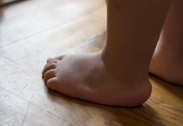Play safety tips to help you and your baby start off on the right foot with baby’s first steps.
Remember baby’s eagerness when she first learned to crawl across the room? And how much fun did baby have when she could pull herself up and cruise along the couch? These are fun milestones for babies to reach and parents to watch. But there’s something extra special about baby’s very first steps. You can see the pride and excitement on baby’s face as she lets go with her hands, finds her balance, and then puts one foot forward, then another. Don’t miss this once-in-a-lifetime developmental wonder with your baby.
When do babies start walking?
The average age for babies to begin walking is around 12 months. Some early explorers will venture forth as early as 8 months, while more cautious kids may not walk until 16 months. So do not worry if other toddlers are walking circles around your crawling fifteen-month-old. Your baby will soon start toddling too.
How can you involve yourself with baby’s first steps?
Here are some fun play tips to help you enjoy this crowning achievement:
- As with all types of play, get down on baby’s level. By interacting with your baby and cheering him on while he cruises along the couch, you build his confidence in his abilities.
- Place toys at various intervals on the couch to spur your baby’s cruising steps.
- Set up your furniture to maximize baby’s cruising. Place couches or love seats a foot or two apart so baby has to reach and step between pieces of furniture.
- Once baby masters cruising, watch as he begins to raise both hands to stand alone. Your praise will encourage him to practice his newly found balance over and over.
- Now baby is ready for those first steps. Instead of holding baby’s hands, which can actually interfere with learning to balance, let baby do it on his own, with you close by.
- Nothing will get those tiny feet moving like your open arms and an inviting “come to mama! (or dada!)”.
- You can also bring out baby’s favorite rattle or plush toy to entice those first steps. Hold the rattle just out of baby’s reach and give it a little shake. Baby will stretch those arms to grab his toy and will step forward with his foot to reach his goal.
- Don’t push it. While some brave explorers will push off from the couch right away, the careful baby may take over a month to go from cruising through standing alone into walking. Be patient. Let your baby be herself.
- If your baby is eager to take steps around the room, but doesn’t quite have the best balancing act, a walking push toy is the perfect way for your baby to gain confidence in his steps.
Safety Tips for Baby’s First Steps
Don’t be too quick to wish for baby to start walking. Along with this skill comes a number of extra safety responsibilities for you:
- It is better for baby to learn to walk in bare feet. Although shoes give babies a wider base for balance, they are harder to take steps in and may make baby trip and fall.
- Make sure baby isn’t holding any toys in his hand during the early weeks of walking. If baby falls, a toy in hand can injure baby’s face.
- Consider putting away your coffee table for a year. Babies can easily stumble into the hard edge of a coffee table. And when baby begins walking fast and running, a high-speed fall against the edge of a low coffee table generally equals a trip to the ER for stitches on the face on injured teeth. A soft ottoman that matches your sofa makes for a safer coffee table.
- Realize that baby’s reach is now twice as high as it used to be. You will need to raise the bar on your baby-proofing efforts to match.
- You don’t necessarily need to hover around baby too closely during early walking. As baby loses her balance, she will generally tend to fall backwards into a sitting position. Her soft bottom is like a built-in airbag to cushion the blow, even on a hard floor.
- Do not use baby walkers (the type that baby sits in and can roll himself around the room). These actually teach baby to use the wrong leg muscles for walking because it makes baby walk in a sitting position. Hundreds of accidents occur each year when babies fall down stairs in a walker.
| 5 Main Developmental Play Stages |
|---|
| All hands & mouth – Birth to 3 mo. |
| Reaching & rolling – 4 to 6 mo. |
| Baby on the move – 6 to 12 mo. |
| Active play – 12 to 24 mo. |
| Creative play – 2 years and up |

